
November 20
1885 Birth: Albert Kesselring: German field marshal during World War II:
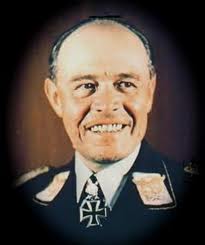
Albert Kesselring, the son of school teacher, was born in Bayreuth, Germany, on 8th August, 1881. He joined the German Army in 1904 and became an officer cadet in the 2nd Bavarian Foot Artillery Regiment at Metz.
During the First World War Kesselring was transferred to the German Army Air Service where he trained as a balloon observer. While in this post he developed a close friendship with Hermann Goering.
Kesselring remained in the armed forces and was promoted to major general in 1932. The following year he joined the recently established Luftwaffe where he served under Erhard Miltch. In June 1936, despite the objections of Miltch, Goering appointed Kesselring as the organization's chief of staff.
On the outbreak of the Second World War Kesselring became commander of 1st Air Fleet and provided air support to General Fedor von Bock and Army Group North in the invasion of Poland. The following year he moved to the 2nd Air Fleet and supported the infantry in the invasions of Belgium, Holland and France. Despite criticisms for his performance during the Dunkirk evacuations, Kesselring was made a field marshal on 19th July 1940.
During Operation Barbarossa Kesselring and his 2nd Air Fleet supported General Fedor von Bock and Army Group Centre in the invasion of the Soviet Union. He then moved to be commander of all German land and air forces in the Mediterranean. On 10th May he ordered the mass bombing of Malta. However, he was forced to abandon the campaign eleven days later when Adolf Hitler decided that the Luftwaffe had to concentrate its efforts in the Soviet Union.
Kesselring remained in North Africa where he supported General Erwin Rommel in the Desert War. On 10th November 1942 Kesselring was appointed to serve under Benito Mussolini as deputy commander of Italian forces. In this position he was unable to prevent the loss of Tunisia and Sicily.
In August 1943 Kesselring led the retreat from the southern regions of Italy. In September his troops came close to stopping General Mark Clark establishing a beachhead at Salerno. He also secured all airfields around Rome that resulted in the Allies calling off their planned airborne assault. Throughout the winter of 1943-4 Kesselring successfully contained the Anzio beachhead.
In the winter of 1943 Kesselring withdrew his forces to what became known as the Gustav Line on the Italian peninsula south of Rome. Organized along the Garigliano and Rapido rivers it included Monte Cassino, a hilltop site of a sixth-century Benedictine monastery. Defended by 15 German divisions the line was fortified with gun pits, concrete bunkers, turreted machine-gun emplacements, barbed-wire and minefields.
On 25th October 1944 Kesselring was seriously injured when his car collided with a gun coming out of a side road. He was in hospital for three months and his command in Italy was taken over by General Heinrich Vietinghoff. When he recovered Adolf Hitler named Kesselring as supreme commander in the south of the country.
Kesselring, the only one of the early field marshals not to be sacked by Hitler, was taken prisoner on 6th May 1945. Tried as a war criminal he was found guilty on 6th May 1947 and condemned to death. Soon afterwards this sentence was commuted to life in prison and was released for health reasons in October 1952. The following year he published his autobiography, A Soldier to the Last Day (1953). Albert Kesselring died on 16th July 1960. (Spartacus.com)
1917 World War I: Various: Cambrai:
We shall now descend the British battle line to the section which extends from Bullecourt in the north to Villers-Ghislain in the south, opposite to the important town of Cambrai, some seven miles behind the Hindenburg Line. It was here that Field-Marshal Haig had determined to strike his surprise blow, an enterprise which he has described in so lucid and detailed a dispatch that the weary chronicler has the rare experience of finding history adequately recorded by the same brain which planned it. The plan was a very daring one, for the spot attacked was barred by the full unbroken strength of the Hindenburg main and support lines, a work so huge and solid that it seems to take us back from these superficial days to the era of the Cyclopean builder or the founder of the great monuments of antiquity. These enormous excavations of prodigious length, depth, and finish are object lessons both of the strength of the Germans, the skill of their engineers, and the ruthlessness with which they exploited the slave and captive labor with which so much of it was built.
Eastern Front: A preliminary armistice is signed between Germany and Russia. Note: According to Russian historian Yuri Polyakov, who also stated the Allies never replied to the Soviet peace proposal of November 8. Leon Trotsky:
By order of the All-Russian Workmen's and Soldiers' Congress, the Council of The People's Commissaries assumed power, with obligation to offer all the peoples and their respective Governments an immediate armistice on all fronts, with the purpose of opening pourparlers immediately for the conclusion of a democratic peace. When the power of the council is firmly established throughout the country, the council will, without delay, make a formal offer of an armistice to all the belligerents, enemy and ally. A draft message to this effect has been sent to all the Peoples' Commissaries for foreign affairs and to all the plenipotentiaries and representatives of allied nations in Petrograd. The council also has sent orders to the citizen Commander in Chief that, after receiving the present message, he shall approach the commanding authorities of the enemy armies with an offer of a cessation of all hostile activities for the purpose of opening peace pourparlers, and that he shall, first, keep the council constantly informed by direct wire of pourparlers with the enemy armies, and, second, that he shall sign the preliminary act only after approval by the Commissaries Council.
Ukraine: President Vinichenko's Proclamation on Independence:
Ukrainian people and all peoples of the Ukraine! An hour of trials and difficulties has come for the land of the Russian Republic. In the north in the capitals (Petrograd and Moscow) a bloody internecine struggle is in progress. A Central Government no longer exists, and anarchy, disorder, and ruin are spreading throughout the State. Our country also is in danger. Without a strong, united, and popular Government, Ukrainia also may fall into the abyss of civil war, slaughter, and destruction.
1923 Weimar: Inflation in Germany peaks at 130,000,000,000 marks to the dollar: (THP)
Before World War I Germany was a prosperous country, with a gold-backed currency, expanding industry, and world leadership in optics, chemicals, and machinery. The German Mark, the British shilling, the French franc, and the Italian lira all had about equal value, and all were exchanged four or five to the dollar. That was in 1914. In 1923, at the most fevered moment of the German hyperinflation, the exchange rate between the dollar and the Mark was one trillion Marks to one dollar, and a wheelbarrow full of money would not even buy a newspaper. Most Germans were taken by surprise by the financial tornado.
1934 Romania: Hermann Goering repeats Germany's offer of October 22 and insists that Romania is not being asked to abandon any of its previous alliances. This offer will be made time and time again, right up to the eve of war.
1935 Holocaust: The Church of England unanimously condemns Nazi persecution of Jews in Germany.
1938 Father Charles Coughlin, head of the misnamed Union of Social Justice, makes a notorious anti-Semitic radio broadcast, prompting group pressure that will eventually force him off the air.
Although anti-Semitic themes appeared in some of Coughlin's speeches fairly early in his career, it wasn't until the late 1930s that the priest's rhetoric became increasingly filled with attacks on Jews. By 1938, the pages of "Social Justice" were frequently filled with accusations about Jewish control of America's financial institutions. In the summer of that year, Coughlin published a version of "The Protocols of the Elders of Zion." A virulently anti-Semitic piece of propaganda that had originated in Russia at the turn of the century, the "Protocols" accused Jews of planning to seize control of the world. Jewish leaders were shocked by Coughlin's actions.
Later that year, the radio priest delivered perhaps his most startling and hateful speech to date. In response to the November 10, 1938, "Kristallnacht" attack on Jews in German-controlled territory, Coughlin began by asking, "Why is there persecution in Germany today?" He went on to explain that "Jewish persecution only followed after Christians first were persecuted.
1940 World War II: Various: Romania: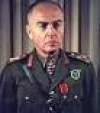
Hungary: Prime Minister Count Teleki and Foreign Minister Csaky agree in Vienna to bring Hungary into the Tripartite Pact.
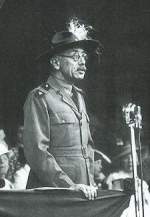
September 27, 1940. . . . the Axis powers are formed as Germany, Italy, and Japan become allies with the signing of the Tripartite Pact in Berlin. The Pact provided for mutual assistance should any of the signatories suffer attack by any nation not already involved in the war. This formalizing of the alliance was aimed directly at "neutral" America--designed to force the United States to think twice before venturing in on the side of the Allies.
The Pact also recognized the two spheres of influence. Japan acknowledged "the leadership of Germany and Italy in the establishment of a new order in Europe," while Japan was granted lordship over "Greater East Asia."
A footnote: There was a fourth signatory to the Pact--Hungary, which was dragged into the Axis alliance by Germany in November 1940
Vichy: Admiral Leahy is appointed United States Ambassador at Vichy:
Franklin D. Roosevelt, who was now president, highly valued Leahy's diplomatic skills and he now appointed him governor of Puerto Rico. Leahy did well in this post and in January 1941, Roosevelt decided to give him the much more difficult task of making him ambassador to the recently formed Vichy government in France.
Leahy's first task was to try to save the French Navy based in Toulon for the Allies. This proved impossible and although he developed good relationships with Henri-Philippe Petain, Pierre Laval and Jean-Francois Darlan he was unable to reduce the influence that Nazi Germany was having on the Vichy government.
1941 World War II: Berlin to Tokyo:
I received a visit from the Thai Minister on the 20th. He opened his remarks by saying that he was also a soldier and would like to have a frank talk with me as between men who had know each other for many years. He then referred to a recent crop of rumors to the effect that JAPAN was to invade THAILAND, and to reports of large Japanese troop concentrations on the Thai frontier of French Indo-China, and asked point blank whether there was any truth in them or not. I replied that I had no news from my home Government on these matters but that my own belief was that Japan's actions toward all Far Eastern races were aimed at applying the principle of live-and-let-live, the fact being that in cases such as that of the recent arbitration between THAILAND and French INDO-CHINA JAPAN had done her utmost for Thailand for this very reason and would never invade THAILAND for the purpose of aggression. But the facts were that GREAT BRITAIN and AMERICA had set up the so-called ABCD front in opposition to JAPAN's establishment of a New Order, finally threatening the existence even of JAPAN herself. JAPAN of course would be compelled to continue her course brushing this aside, and that she wished to attain this and by peaceful means was obvious from the mere fact of her having sent Mr. KURUSU to AMERICA. However if the worst came to the worst and it was unavoidable, JAPAN would have to take the necessary steps for her own existence. . . . not that there would be any question of this happening if THAILAND soon understood JAPAN's ultimate purpose and displayed an attitude of cooperation with JAPAN; she would have to invade THAILAND only if that country should blindly follow the lead of GREAT BRITAIN and AMERICA and take up an attitude of opposition. The Minister interposed by describing the position in which THAILAND was placed and by stating emphatically that THAILAND would never oppose JAPAN as an Anglo-American cat's-paw. When suggesting his visit the Minister said that he wished to see me urgently, and OMMINISI's view that he probably came on instructions from his home Government. The Germans are also extremely interested in Thai problems and I should be glad if you would inform me at once as to the latest situation.
1942 World War II: Stalingrad: Northeast and southwest of Stalingrad, the attacking Soviet armies are making rapid progress in the direction of Kalach on the Don, the chosen meeting-point of the two pincers. 6 and 4 Armee hurriedly dispatch mobile units to bolster the unprepared and crumbling German defenses west and south of the Don. A crisis of major proportions is in the offing.
Stalin to FDR:

We have begun the offensive operations in the Stalingrad area - in its southern and north-western sectors. The objective of the first stage is to seize the Stalingrad-Likhaya railway and disrupt the communications of the Stalingrad group of the German troops. In the north-western sector the German front has been pierced along a 22-kilometre line and along a 12-kilometre line in the southern sector. The operation is proceeding satisfactorily.
From captured German teletype communications:
1. Following supplementary report is made about landing of a British freight glider at Egersund in the night of November 20. a) No firing on the part of the German defense. b) The towing plane (Wellington) crashed after touching the ground. . . . On 20 November 1942 at 5:50 an enemy plane was found 15 kilometers northeast of Egersund. It is a British aircraft (towed glider) made of wood without engine. Of the 17 member crew three are dead, six are severely, the others are slightly, wounded. All wore English khaki uniforms without sleeve insignia. Furthermore, following items were found: 8 knapsacks, tents, skis, and radio sender, exact number still unknown. The glider carried rifles, light machine guns and machine pistols, number unknown. At present the prisoners are with the battalion in Egersund. . . . Beside the 17-member crew extensive sabotage material and work equipment were found. Therefore the sabotage purpose was absolutely proved. The 280th Infantry Pision ordered the execution of the action according to the Fuehrer Order. The execution was carried out toward the evening of 20 November. Some of the prisoners wore blue ski-suits under their khaki uniforms which had no insignia on the sleeves. During a short interrogation the survivors have revealed nothing but their names, ranks and serial numbers . . . . In connection with the shooting of the 17 members of the crew, the Armed Forces Commander of Norway has issued an order to the district commanders, according to which the interrogations by G-2 and by BDS (Befehlshaber der Sicherheitspolizei, that is, the police) are important before the execution of the Fuehrer Order; in case of Paragraph Number 4 of the Fuehrer Order, the prisoners are to be handed over to the BDS.
1943 World War II: War in the Pacfic: A force of 5,000 US Marines lands on Tarawa in the Gilbert Islands. Fighting is ferocious and casualties high.
Tarawa is located approximately 2,500 miles southwest of Hawaii. It isn't an island but a series of barren islets formed by the exposed tips of a submerged mountain sticking above the waters of the blue sea. The military importance of Tarawa lay in its strategic location at the gateway of the US drive through the central Pacific towards the Philippines. . . . The landings began on November 20 and immediately ran into trouble. Coming in at low tide, the assault boats were forced to disgorge their men far from shore. Wading through waist-deep water over piercing, razor-sharp coral, many were cut down by merciless enemy gunfire yards from the beach. Those who made it ashore huddled in the sand, hemmed in by the sea to one side and the Japanese to the other.
1943 World War II: Eastern Front: The Red Army achieves a breakthrough near Kremenchuk in the Ukraine, and advances toward Kirovograd. "Kremenchuk suffered heavily under Nazi occupation. More than 90% of the city's buildings were leveled over the course of the war, and most of Kremenchuk's once substantial Jewish population was wiped out."
1944 World War II: Various: Albania: German troops evacuate Tirana:
Before the end of November, the Germans had withdrawn from Tirana, and the communists, supported by Allied air cover, had no problem taking control of the capital. A provisional government the communists had formed at Berat in October administered Albania with Enver Hoxha as prime minister, and in late 1944 Hoxha dispatched Albanian partisans to help Tito's forces rout Albanian nationalists in Kosovo. Albania stood in an unenviable position after World War II. Greece and Yugoslavia hungered for Albanian lands they had lost or claimed.
Adolf Hitler leaves the Wolf's Lair and travels to his headquarters near Bad Nauheim:
Hitler's most well-known field headquarters, Wolfschanze (Wolf's Lair), was located in Rastenburg (Ketrzyn), East Prussia (now Poland), 200 km north of Warsaw. It was built in 1941 and enlarged in 1944.
The German invasion of the Soviet Union began June 22, 1941. Hitler arrived at Wolfschanze on June 24th. While the dictator stayed only a few weeks in his other redoubts, he spent three years at Wolfschanze, a place Colonel General Alfred Jodl described as "a cross between a cloister and a concentration camp." Hitler left Wolfschanze November 20, 1944, as the Red Army approached. On January 24, 1945, German soldiers dynamited the bunkers.
London lights up as the blackout is lifted for the first time in five years.
Stalin to Churchill:
Thank you for your information about your conversations with de Gaulle. I have acquainted myself with your communication with interest. I have nothing against your proposal about a possible meeting between us three and the French, provided the President also agrees with this, but it is necessary first to settle definitely about the time and place of the meeting between us three. General de Gaulle expressed recently his wish to come to Moscow to establish contact with the leaders of the Soviet Government. We replied agreeing to this. The French are expected to arrive in Moscow towards the end of this month. The French have not yet specified the questions they would wish to discuss. In any case, after our conversation with General de Gaulle I will let you know about it.
1945 Nuremberg Tribunal: Various:
The trial of 22 of the most important of the major German war criminals by the International Military Tribunal begins at 10 a.m. in Nuremberg, Germany. The defendants include Hess, Goering and Speer.
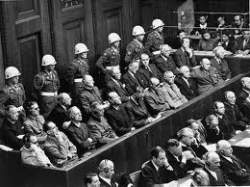
In order to make their rule secure from attack and to instill fear in the hearts of the German people, the Nazi conspirators established and extended a system of terror against opponents and supposed or suspected opponents of the regime. They imprisoned such persons without judicial process, holding them in "protective custody" and concentration camps, and subjected them to persecution, degradation, despoilment, enslavement, torture, and murder. These concentration camps were established early in 1933 under the direction of the Defendant Goering and expanded as a fixed part of the terroristic policy and method of the conspirators and used by them for the commission of the Crimes against Humanity.
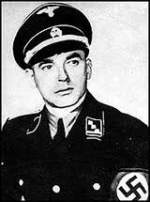
Gleiwitz Incident: Alfred Naujocks: SS secret-service veteran and member of the SD, signs a sworn affidavit stating that Reinhard Heydrich had personally ordered him to fake a Polish attack on the German radio station at Gleiwitz on the German-Polish border on August 31, 1939. Hitler, he says, planned to use this faked attack as his public justification for attacking Poland.
1947 Princess Elizabeth marries Philip Mountbatten:
In a lavish wedding ceremony at Westminster Abbey in London, Princess Elizabeth marries her distant cousin, Philip Mountbatten, a dashing former prince of Greece and Denmark who renounced his titles in order to marry the English princess.
Princess Elizabeth, heir to the British throne, was 21 years old. Philip Mountbatten, age 26, had fought as a British naval officer during World War II and was made the duke of Edinburgh on the eve of his wedding to Elizabeth. The celebrations surrounding the wedding of the popular princess lifted the spirits of the people of Britain, who were enduring economic difficulties in the aftermath of World War II.
On February 6, 1952, the death of King George VI sent Elizabeth to the throne, and Philip ended his naval career to concentrate on his new duties as consort of the British monarch. Elizabeth and Philip eventually had four children--Prince Charles, Princess Anne, Prince Andrew, and Prince Edward. (History.com)
1948 Cold War: American consul in China held "hostage" by communists: "In what begins as a fairly minor incident, the American consul and his staff in Mukden, China, are made virtual hostages by communist forces in China. The crisis did not end until a year later, by which time U.S. relations with the new communist government in China had been seriously damaged." [For further information, click here] 1963 Anne Frank’s Captor Found: VIENNA — A Jewish investigator has tracked down the man responsible for the arrest of Anne Frank, whose wartime experiences were immortalized in a diary written before her death in a Nazi extermination camp. An Austrian Interior Ministry spokesman identified the man today as Karl Silberbauer, 52, an inspector in the Vienna police force, and said he has been suspended from his post pending an investigation. Silberbauer reportedly told Austrian officials that the Amsterdam Gestapo had been tipped off by a Dutch informer about the family’s hideout. (International Herald Tribune)
1966 The musical "Cabaret" opens on Broadway:
Cabaret is a musical based on a book written by Christopher Isherwood, music by John Kander and lyrics by Fred Ebb. The 1966 Broadway production became a hit, inspiring and spawned numerous subsequent productions in London and New York, as well as a 1972 film by the same name.
It is based on John Van Druten's 1951 play I Am a Camera, which was adapted from the short novel Goodbye to Berlin (1939) by Christopher Isherwood. Set in 1931 Berlin as the Nazis are rising to power, it is based in nightlife at the seedy Kit Kat Klub, and revolves around the 19-year-old English cabaret performer Sally Bowles and her relationship with the young American writer Cliff Bradshaw.
A sub-plot involves the doomed romance between German boarding house owner Fräulein Schneider and her elderly suitor Herr Schultz, a Jewish fruit vendor. Overseeing the action is the Master of Ceremonies at the Kit Kat Klub. The club serves as a metaphor for the threatening state of late Weimar Germany. [For further information, click here]
1975 Death: Spain: Gen. Francisco Franco died after nearly four decades of absolute rule. (AP)
1977 Address to the Knesset: Following the historic address of Anwar Sadat, President of the Arab Republic of Egypt to the Knesset, the reply of the Israeli Prime Minister, Menachem Begin, included the following:
I accompanied you this morning, Mr. President, to Yad Vashem. With your eyes you saw what the fate of our People was when this Homeland was taken from it. It is an incredible story. We both agreed, Mr. President, that whoever has not himself seen what is found in Yad Vashem cannot understand what befell this People. And we both read a document dated 30 January 1939, in which the word "Vernichtung" appears:"If war breaks out the Jewish race in Europe will be annihilated." Then, too, we were told to pay no heed to such words. The whole world heard. No one came to our rescue; not during the nine critical, fateful months following this announcement and not during those six years when millions of our people, among them a million and a half small Jewish children were slaughtered in every possible way.
And therefore we, this entire generation, the generation of Holocaust and Resurrection, swore an oath of allegiance: never again shall we endanger our People; never again will our wives and our children -- whom it is our duty to defend, if need be even at the cost of our lives -- be put in the devastating range of enemy fire. And further: ever since then it has been, and will continue to be, our duty, for generations to come, to remember that certain things said about our People are to be related to with all seriousness. We must not, Heaven forbid, for the future of our People, accept any advice suggesting that we not take such words seriously.
2013 USA: Joseph Franklin, white supremacist serial killer, executed:
A US white supremacist who targeted black and Jewish people in a nationwide killing spree has been put to death in the US state of Missouri. Joseph Franklin was executed for shooting dead a man and wounding two others outside a synagogue in 1977. The 63-year-old was convicted of seven other racially motivated murders. He claimed to have committed 20 in total. His execution came after the US Supreme Court upheld an appeal court's decision to lift a stay of execution. [For further information, click here]
Edited by Levi Bookin (Copy editor) Click to join 3rdReichStudies
FAIR USE NOTICE: This site may contain copyrighted material the use of which has not always been specifically authorized by the copyright owner. We are making such material available in our efforts to advance understanding of historical, political, human rights, economic, democracy, scientific, environmental, and social justice issues, etc. We believe this constitutes a 'fair use' of any such copyrighted material as provided for in section 107 of the US Copyright Law. In accordance with Title 17 U.S.C. Section 107, the material on this site is distributed without profit to those who have expressed a prior interest in receiving the included information for research and educational purposes. If you wish to use copyrighted material from this site for purposes of your own that go beyond 'fair use', you must obtain permission from the copyright owner.
Please note that the list-owner and the moderator are not responsible for, and do not necessarily approve of, the random ads placed on our pages by our web server. They are unfortunately, the price one pays for a 'free' website.
levi.bookin@gmail.com






